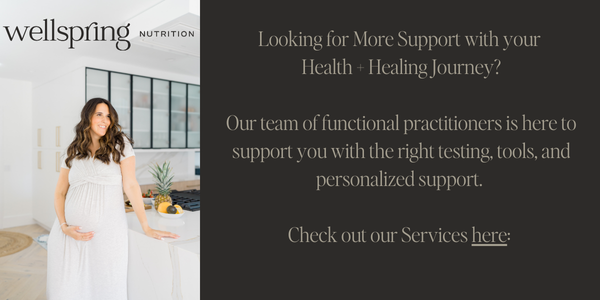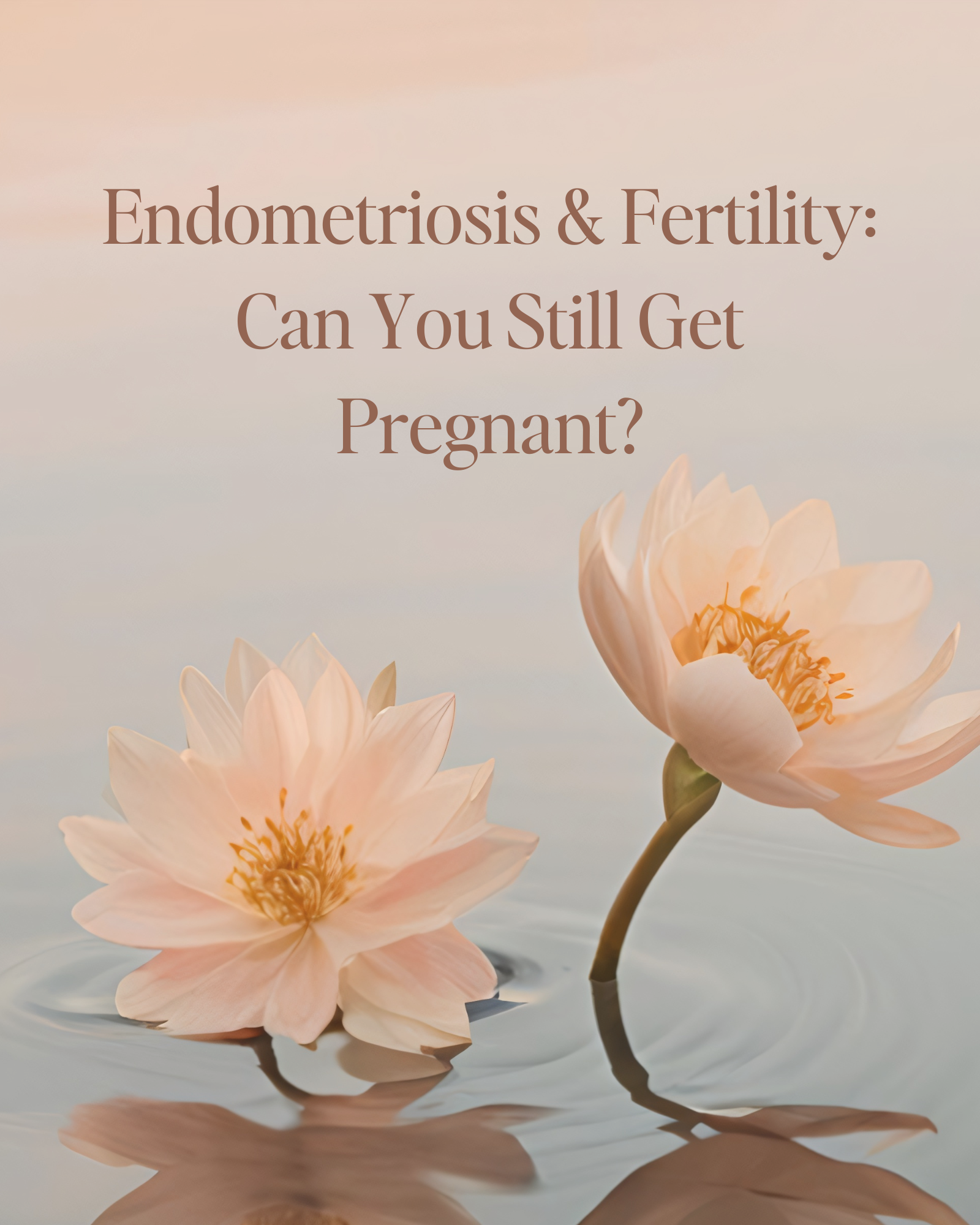Resources
Style
Planning
View All
THE blog
Written by: Lauren Chamberlain
Edited and Reviewed By: Anabelle Clebaner MS, RDN
Dealing with endometriosis is already a challenge—pain, fatigue, and the frustratingly long journey to diagnosis. But for many, one of the hardest realities to face is how this condition might impact fertility. Whether you’re actively trying to conceive or simply thinking about the future, it’s natural to wonder: Will I be able to get pregnant? Will it take longer? Am I at risk for complications?
Let’s break it down—why does endometriosis make conception more difficult? And what can be done to improve fertility outcomes?
Fertility and Endometriosis: The Numbers
Studies suggest that up to 50% of people with endometriosis may experience fertility challenges, and about half of those diagnosed with infertility have underlying endometriosis. However, a diagnosis doesn’t mean pregnancy is impossible! It may take longer, require medical support, or necessitate lifestyle adjustments—but many people with endometriosis go on to conceive and carry healthy pregnancies.
Now that we’ve covered the statistics, let’s explore why endometriosis affects fertility in the first place.
Understanding the Connection: Why Endometriosis Affects Fertility
Endometriosis is a complex condition where tissue similar to the uterine lining grows outside the uterus, leading to inflammation, scarring, and hormonal imbalances. These factors can contribute to fertility struggles in multiple ways:
1. Chronic Inflammation and Hormonal Imbalances
Endometriosis is associated with chronic inflammation, which plays a key role in fertility challenges. The condition causes an increase in inflammatory cytokines—proteins that regulate immune responses. These cytokines can interfere with ovulation, fertilization, and implantation by creating a hostile uterine environment. Chronic inflammation may also impair the function of the corpus luteum, the structure responsible for producing progesterone after ovulation. Since progesterone is critical for preparing the uterine lining for implantation, low levels may result in implantation failure or early miscarriage.
Additionally, endometriosis is often linked to estrogen dominance. Excess estrogen can thicken the endometrial lining abnormally, disrupt the menstrual cycle, and contribute to a suboptimal hormonal balance for conception.
2. Reduced Egg Quality and Oxidative Stress
Endometriosis has been linked to oxidative stress, a condition where an excess of reactive oxygen species (ROS) damages cellular structures, including eggs. This oxidative damage can lead to:
- DNA fragmentation in eggs, reducing their ability to be fertilized.
- Lower embryo quality, decreasing the likelihood of successful implantation.
- Higher rates of aneuploidy (chromosomal abnormalities), which can lead to failed pregnancies or birth defects.
Research suggests that targeted nutritional strategies, such as increasing antioxidant intake (e.g., vitamin C, vitamin E, and CoQ10), can help mitigate oxidative stress and improve egg quality.
3. Decreased Ovarian Reserve and Endometriomas
Many individuals with endometriosis develop ovarian cysts known as endometriomas. These cysts, filled with old blood, can impact ovarian function in several ways:
- Damage to ovarian tissue: As endometriomas grow, they can infiltrate and compromise healthy ovarian tissue, reducing the number of viable eggs.
- Lower response to fertility treatments: Studies indicate that individuals with endometriomas often have a lower ovarian response to stimulation during assisted reproductive technologies (ART) like in vitro fertilization (IVF).
- Surgical risks: While surgical removal of endometriomas may relieve symptoms, it can also reduce ovarian reserve if healthy ovarian tissue is inadvertently removed during the procedure. Those considering surgery should discuss fertility preservation strategies, such as egg freezing, beforehand.
4. Blocked Fallopian Tubes and Pelvic Adhesions
Endometriosis can cause adhesions—bands of fibrous scar tissue that develop between organs. These adhesions may:
- Block or distort the fallopian tubes, preventing eggs from traveling to meet sperm.
- Interfere with ovulation, making it more difficult for the ovaries to release eggs effectively.
- Cause fluid buildup in the fallopian tubes (hydrosalpinx), which can create an inhospitable environment for embryos and decrease implantation success.
For those with significant tubal damage, natural conception may be challenging, and assisted reproductive technologies like IVF may be necessary.
5. Implantation Challenges and Uterine Dysfunction
Successful pregnancy depends on a fertilized egg implanting into a healthy uterine lining. Endometriosis can interfere with this process due to:
- Abnormal endometrial receptivity: The endometrium (uterine lining) may not develop properly due to chronic inflammation, hormonal imbalances, or scarring.
- Increased uterine contractility: The uterus may contract excessively, making it harder for an embryo to implant and remain stable.
- Altered immune response: Inflammatory and immune factors in the uterine environment may mistakenly attack the embryo, leading to implantation failure or early miscarriage.
Pregnancy with Endometriosis: Risks & Considerations
While many individuals with endometriosis achieve healthy pregnancies, it’s important to be aware of potential risks and considerations:
1. Increased Risk of Obstetrical Complications
Studies have identified a higher incidence of certain complications in pregnant individuals with endometriosis:
- Preterm Birth: There is an elevated risk of delivering before 37 weeks of gestation.
- Placenta Previa: The placenta may implant low in the uterus, covering the cervix, which can lead to bleeding and necessitate a cesarean section.
- Hypertensive Disorders: Conditions like preeclampsia, characterized by high blood pressure and potential damage to other organ systems, are more common.
- Gestational Diabetes: An increased likelihood of developing diabetes during pregnancy has been observed.
- Cesarean Delivery: The necessity for cesarean sections is higher among those with endometriosis.
These findings underscore the importance of vigilant prenatal care for individuals with endometriosis to monitor and manage potential complications effectively.
2. Impact of Surgical Treatment on Pregnancy Outcomes
Surgical interventions for endometriosis, such as laparoscopic excision, aim to alleviate symptoms and improve fertility. However, the effects of surgery on pregnancy outcomes are complex:
- Adhesion Formation: Post-surgical adhesions can lead to chronic pelvic pain and may impact fertility.
- Ovarian Reserve: Surgical removal of endometriomas (ovarian cysts associated with endometriosis) can reduce ovarian reserve, potentially affecting fertility.
Therefore, surgical decisions should be individualized, weighing the benefits against potential risks, and discussed thoroughly with a healthcare provider.
3. Importance of Preconception Counseling
Given the potential challenges associated with endometriosis and pregnancy, preconception counseling is highly recommended. This process involves:
- Comprehensive Evaluation: Assessing the extent of endometriosis and its impact on reproductive organs.
- Fertility Assessment: Evaluating ovarian reserve and tubal patency to determine the best conception strategies.
- Risk Discussion: Understanding the potential obstetrical risks and planning appropriate monitoring and interventions.
Engaging in preconception counseling allows for informed decision-making and the development of a tailored care plan to optimize pregnancy outcomes.
4. Nutritional and Lifestyle Modifications
Adopting specific dietary and lifestyle changes can positively influence fertility and pregnancy outcomes in individuals with endometriosis:
- Anti-Inflammatory Diet: Consuming foods rich in antioxidants can reduce oxidative stress and improve egg quality.
- Regular Physical Activity: Engaging in moderate exercise can enhance overall health and reduce inflammation.
- Stress Management: Incorporating stress-reduction techniques like yoga or meditation may improve hormonal balance.
Implementing these modifications can support reproductive health and may increase the likelihood of a successful pregnancy.
5. Assisted Reproductive Technologies (ART)
For those experiencing difficulty conceiving naturally, ART options such as in vitro fertilization (IVF) may be considered. While endometriosis can impact the success rates of ART, individualized treatment protocols and close monitoring can enhance outcomes. Consulting with a fertility specialist can provide personalized guidance on the most appropriate interventions.
Ultimately, while endometriosis can pose challenges to conception and pregnancy, understanding the potential risks and proactively managing them with a healthcare team can lead to successful outcomes.
What Can You Do?
If you have endometriosis and are concerned about your fertility, there are steps you can take to optimize your chances of conception:
- Adopt an anti-inflammatory diet: Eat foods rich in antioxidants, such as leafy greens, berries, turmeric, and omega-3 fatty acids, to combat oxidative stress and support egg quality.
- Consider medical treatment: Hormonal therapies like GnRH agonists, birth control pills, or progestin therapy may help manage symptoms and improve fertility outcomes.
- Support gut health: A balanced gut microbiome helps regulate inflammation. Incorporate probiotic-rich foods like yogurt, kefir, kimchi, and sauerkraut, or consider a high-quality probiotic supplement.
- Optimize lifestyle factors: Engage in regular, low-impact exercise like yoga or walking to reduce inflammation and support reproductive health. Prioritize stress management techniques, such as meditation or deep breathing, and ensure you’re getting enough quality sleep.
- Work with a fertility specialist: A reproductive endocrinologist or fertility dietitian can assess your specific needs and create a personalized plan, whether you’re trying to conceive naturally or exploring medical interventions.
- Discuss fertility preservation: If you’re not trying to conceive yet but may want to in the future, options like egg freezing can help safeguard your reproductive potential.
Final Thoughts
Endometriosis may make conception more challenging, but it doesn’t mean it’s out of reach. Every fertility journey is different, and while endometriosis can present obstacles, there are many ways to take control of your reproductive health. Whether through lifestyle changes, medical treatments, or working with a specialist, you have options. If you’re struggling, reach out to a healthcare provider to explore the best path for you. Knowledge is power, and by understanding the impact of this condition, you can approach your fertility journey with confidence and clarity.

Sources
https://pmc.ncbi.nlm.nih.gov/articles/PMC9983692
https://pmc.ncbi.nlm.nih.gov/articles/PMC8224039
https://www.rbmojournal.com/article/S1472-6483(13)00007-2/fulltext
https://pmc.ncbi.nlm.nih.gov/articles/PMC8065992
https://pmc.ncbi.nlm.nih.gov/articles/PMC7226034
https://pmc.ncbi.nlm.nih.gov/articles/PMC9528818
https://pmc.ncbi.nlm.nih.gov/articles/PMC10058497/#sec5-life-13-00654
https://pmc.ncbi.nlm.nih.gov/articles/PMC10820275

Want to know how to boost your fertility diet?
Then you need to learn about Choline! Choline is just as important in helping to prevent neural tube defects as the well known vitamin folate, but unfortunately, it’s not as well known or spoken about. If you’re looking for some choline rich foods for fertility, then read on!
Choline also plays an important role in:
- Supporting the transfer of nutrients across the placenta to ensure your baby receives the nutrients it needs
- Fetal brain development
- May assist in reducing the chances of your baby developing chronic diseases later in life
What’s the data?
The research that has been done over the past 20 years, outlines very clearly the benefits of choline when it comes to both overall health during pregnancy and the development of our babies brain.
Studies on animal models have shown that Choline plays a key role in enhancing brain function and also serves to protect the brain and its various elements as it develops.

Human studies on the other hand have shown that taking Choline in doses higher than what is currently recommended by various health bodies, has multiple benefits, including:
- Enhancing the function of the placenta
- May reduce the risk of preeclampsia
- Improves brain development in the infant
- Boosts reaction times in the infant
- Enhances an infants visual memory
Why haven’t you heard of Choline before?
Unfortunately, the research around Choline is relatively new in scientific terms (by this I mean the research has only really been looking into this topic for the past 20 years), and it’s not a well known supplement when it comes to fertility (well outside of the dietetic community anyway!).
The evidence while not well known, is really promising and it is well worth aiming to include more sources of choline in your diet if you are trying to conceive or pregnant.
So where do you find Choline?
Choline is found in the highest amounts in animal products.

Top Choline Rich Foods for Fertility:
- Eggs
- Salmon
- Beef
- Chicken
- Dairy products
- Soybeans
Like many other nutrients, our choline needs increase dramatically during pregnancy with some studies suggesting that our choline needs may be almost double what is currently recommended by the guidelines.
Should I supplement Choline?
Unfortunately, many of us don’t currently get our choline needs from food alone, and in these cases a supplement may be of benefit to support a healthy pregnancy. Not all prenatal supplements contain Choline, and some also don’t contain enough to provide you with all the benefits. Some of my favorite prenatals that include adequate choline are FullWell Prenatal and Needed.
If you’re already taking a prenatal that doesn’t have choline, consider supplementing or assessing your diet to see if you meet the choline requirements for adequate fertility and pregnancy. You can find more fertility supportive supplements in my fertility dispensary here. Remember, it’s important to ensure that you work with a professional when selecting the right prenatal supplements for you!
Looking for More Support?

Looking for more 1-on-1 support on your fertility journey? Apply for a free 20 minute strategy call today. I can help you regulate your cycles, ovulate, and have a healthy pregnancy using my proven functional nutrition method. I look forward to speaking with you!
References:
- Blusztajn, Jan Krzysztof, and Tiffany J. Mellott. “Neuroprotective actions of perinatal choline nutrition.” Clinical chemistry and laboratory medicine 3 (2013): 591-599.
- Kwan, Sze Ting Cecilia, et al. “Maternal choline supplementation during pregnancy improves placental vascularization and modulates placental nutrient supply in a sexually dimorphic manner.” Placenta 45 (2016): 130. ; Jiang, Xinyin, et al. “A higher maternal choline intake among third-trimester pregnant women lowers placental and circulating
- Boeke, Caroline E., et al. “Choline intake during pregnancy and child cognition at age 7 years.” American journal of epidemiology 12 (2012): 1338-1347.
- What Is Choline? An Essential Nutrient With Many Benefits (healthline.com)

The Preconception Playbook
This free playbook provides specific actionable tips to get started on your fertility journey, as well as what to avoid while you're trying to conceive.
Get the free playbook
